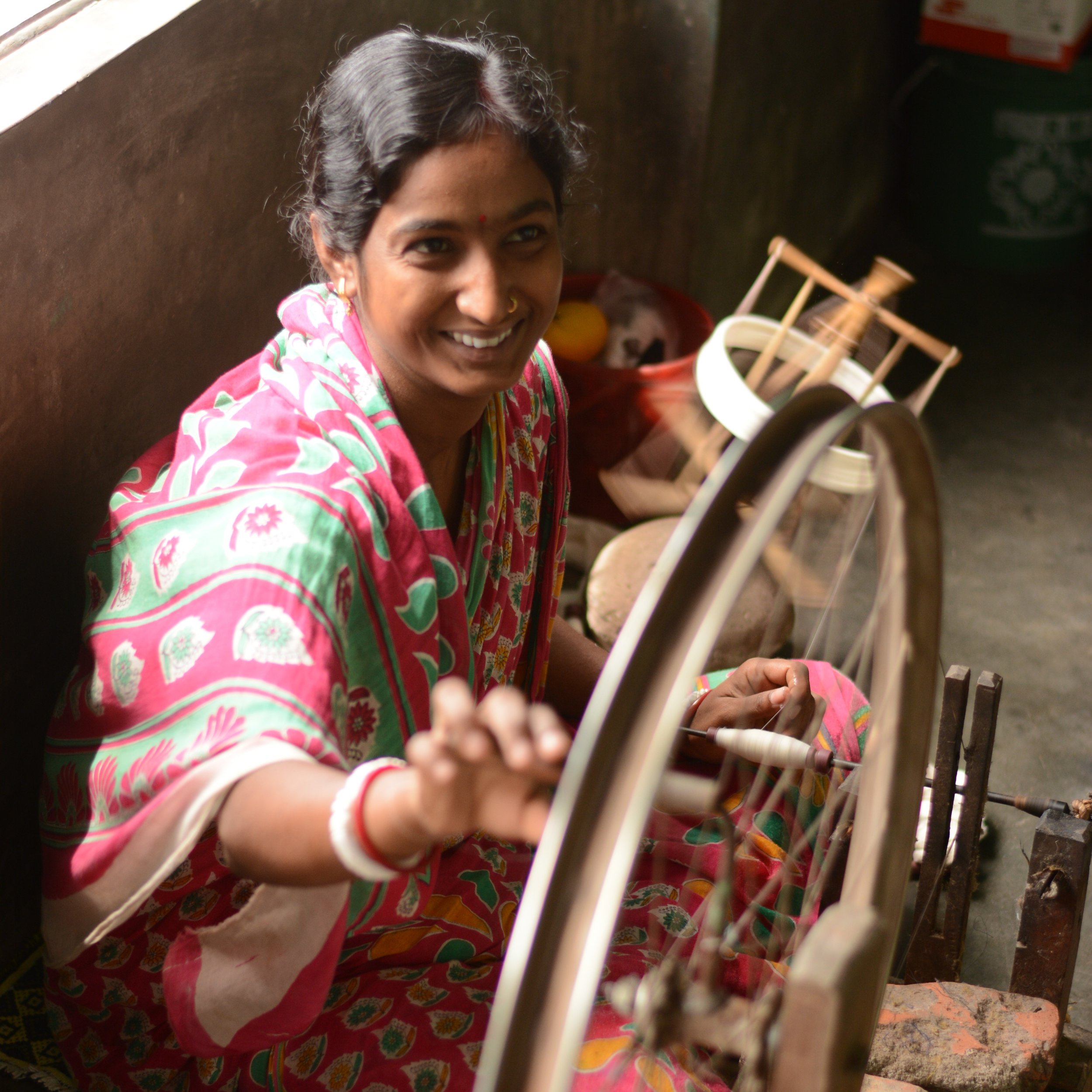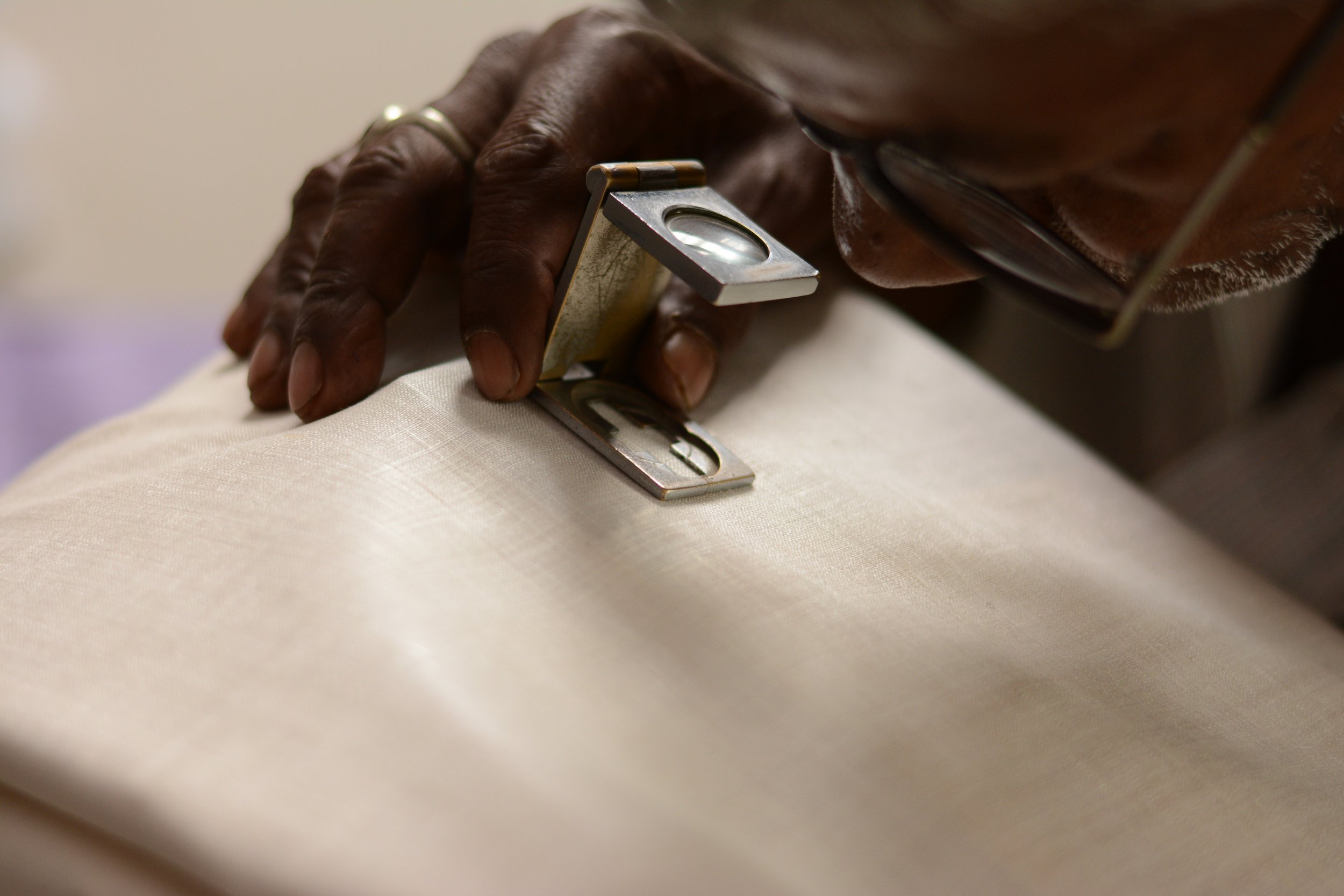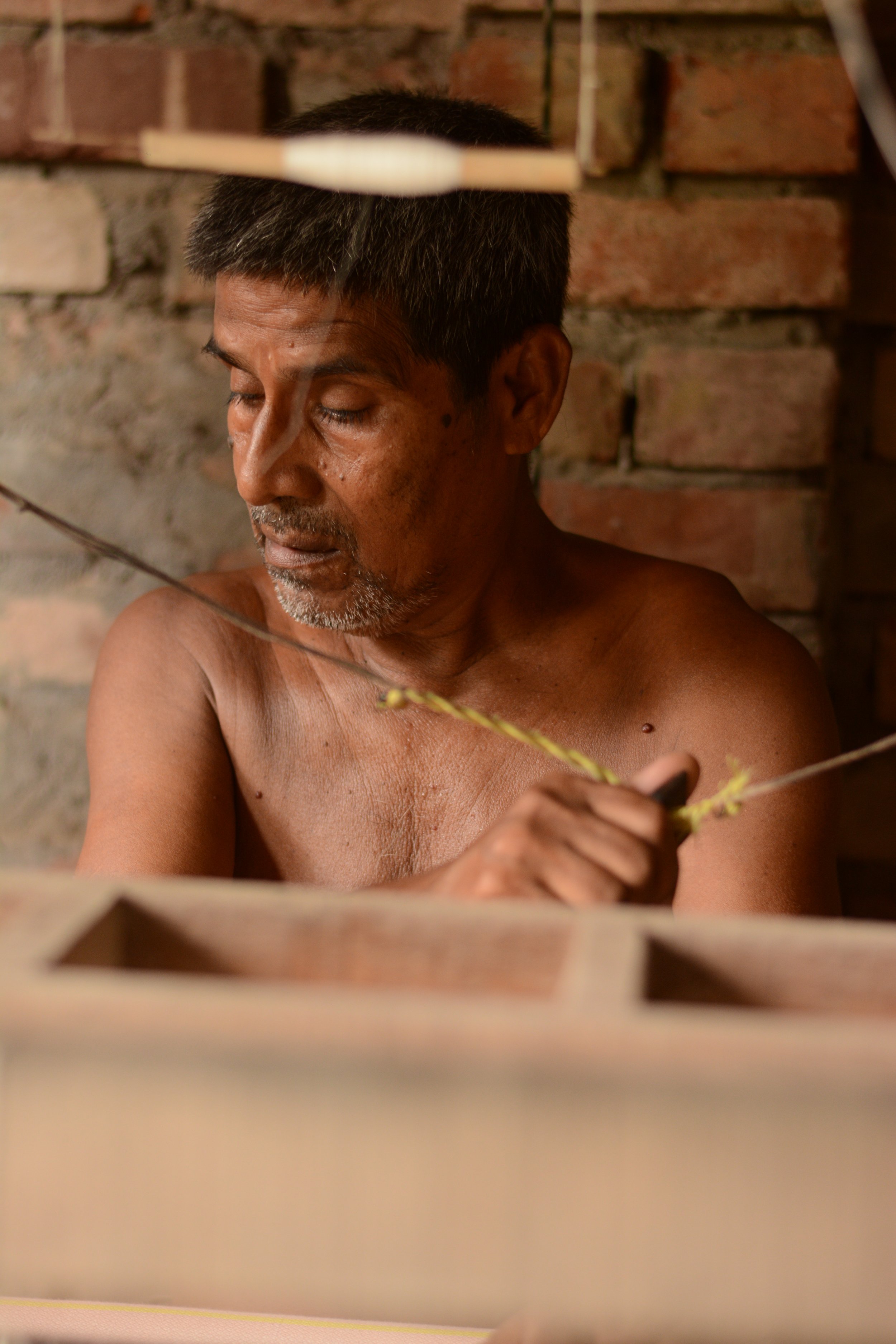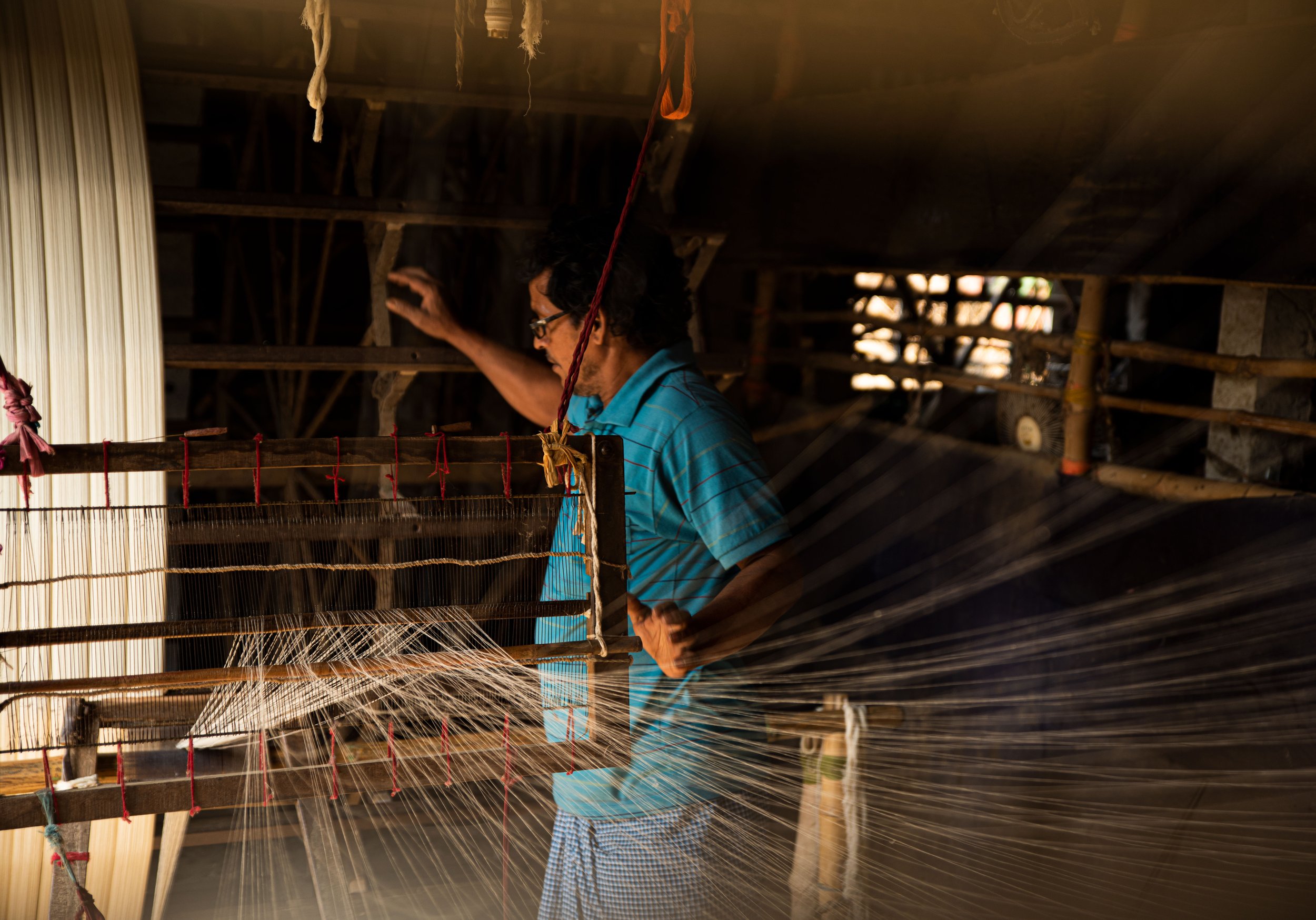Amit Singha, Founder of Anuprena
West Bengal is historically famous for its textile industry, but who are the artisans behind these beautiful fabrics?
Entrepreneur, Amit Singha, grew up in West Bengal surrounded by artisans. His father worked closely with these skilled craftsmen and women, and encouraged Amit to pursue work to support these artisan communities, but they both had to face an undeniable truth, their communities were struggling and the number of artisans was diminishing. Still, Amit was determined to find a way to help.
Amit went on to study computer engineering and received his MBA. He took on work in the financial strategy sector in Bangalore, but his true ambition to become an entrepreneur and support local artisans was never far from his mind. After gaining valuable experience in Bangalore, Amit came home to care for his father and to begin his journey as an entrepreneur.
One of the major issues facing the textile industry in West Bengal is the number of artisans in business is decreasing over time. This is especially true for certain intricate crafts like Jamdani silk and fine Khadi since they have price competition from machine-made fabrics and fibers. Anuprerna is working to raise global awareness for these handmade, one of a kind, crafts through the use of innovative digital technology.
Q. What inspired you to start Anuprerna?
My hometown is in Bengal and I'm situated in a place which is surrounded by artisans. I was born and brought up in this area and many artisans used to come to my house as my father used to work closely with them. This was one of the things that had a major impact on me while I was growing up. I'd already seen the artisan ecosystem around me, but eventually I realized with time, that the system is breaking and my father felt the same way. The artisans are not there anymore, they are switching professions and this issue always lingered in my mind.
My father motivated me to support the ecosystem and profession at some point. So after working for a few years, I took the plunge into entrepreneurship. I built on what I knew and kept adding to it, to make a sustainable and scalable business and that's how I started Anuprerna.
Q. Do you think your experiences in the corporate world informed or affected your approach when you became an entrepreneur?
It was a completely different journey from a professional perspective, since finance, strategy was not an immediate requirement when I started working on Anuprerna. I had to start from operations and then make my way to marketing and production but what mainly helped me is my ability to look at any business from a holistic view. I want to not only focus on what I'm doing but also focus on the industry at large, or the market at large. I love to check out what the competitors are doing and how the industry is doing globally.
One of the things I liked about joining Anuprerna was that my inquisitiveness around this sector increased tenfold when I was researching. I was able to learn about the global perspective of this industry and also look at it from an e-commerce perspective. The holistic approach of looking at any business is what I think I learned through my education and my work culture.
Q. What is the core problem that you're working on in this industry?
One core problem is lack of awareness about how these artisan ecosystems work and the product quality that the end consumer gets. End consumers want to understand how this product is made and the process behind it. So that's one of the technical problems - creating awareness.
Especially with the pandemic, I realized that people started supporting small businesses with a sustainable approach, keeping social responsibility in mind. In this particular industry I can safely say that there is more demand from the younger generation around sustainable action, as working with artisans is a part of social responsibility too. That's when I realized that there's a demand in the market and gradually it will increase over the years.
This is why we try to make our products and processes as transparent as possible in front of consumers. This transparency also increases the chances of getting noticed by consumers all around the world. I feel the core problems can be solved by catering to consumers with the mindset of sustainability and ethical production.
Q. Can you tell us a little bit about the artisans that you work with?
We work with multiple artisan communities but we mainly focus on artisans in my city, from West Bengal. West Bengal is famous for its crafts and clusters as the artisans have expert expertise in certain crafts and techniques. Artisan communities consist of clusters which are basically a community of villages.
Each cluster has learned about particular techniques through the community or their friends & family and we work with them. Similarly we work with different kinds of clusters around Bengal. Some artisans specialize in Khadi in which they hand weave fine fabrics and also Jamdani silk. This is how this community works.
Q. What is your maybe one biggest takeaway from your entrepreneurial journey so far? What would it be?
I'll say that it's obviously not easy being an entrepreneur. There are times you feel excited since you are strategizing on certain elements, but obviously there are times when you feel discouraged as well because it's really difficult. You can watch and listen to successful people in the field and try to follow their footsteps but I feel that each entrepreneur has their own journey, and what is important is that you enjoy your journey as well. As long as you're enjoying the journey, excited about the vision and trying to bring about change you will find your entrepreneurial journey enriching.
Q. Were there any big Aha! or Oh no! moments that you kind of came across? As you were trying to figure this out?
From this industry's perspective, there is a lack of awareness about the products and consumers also prefer to feel, touch and experience the products before buying it. So in my experience, there are many consumers who have received our products and they were pretty blown away by the comfort and quality of the products. They had never seen such beautifully designed products by artisans before and fell in love with it. This was my Aha! moment since I realized that many consumers were not exploring artisan made products.
After we started getting repeat clients, we got market knowledge that we gained through our experience. Another learning is about the usage of digital presence to scale products. Initially I didn't realize the kind of client segment I should focus on but through digital presence we were able to ascertain that globally there are different kinds of customer personas that are getting attracted to these products. This information I would not have gathered had we not been digitally present.
Oh no! moment for me would be that it is very difficult to bring in production, processes and quality control in the artisan community since it is very decentralized. Fortunately for me, I already had a strong rapport with the artisans so I could work through the issues and set up a system which can deliver reliable products to consumers. These are some of the findings I have found over the years.
Q. What is the advice you will give an aspiring entrepreneur, especially who is starting off in your field or working with artisans?
Aspiring entrepreneurs who do not have any experience in the textile industry, like me when I started off, will have a certain vision and will try their best to implement it to bring elements of change in the ecosystem. It will seem like the best idea in the world at that point but it might not pan out from a futuristic frame of reference. As you learn and implement processes, be adaptable and go with the flow. I would advise them to enjoy the journey, trust your instinct and things will fall into place eventually.


















The Tribal Hermit is a social impact venture that works closely with 130+ Dhokra craft artisans from Kondagaon, Bastar, and Raigarh districts of Chhattisgarh to design, create, and sell their products.